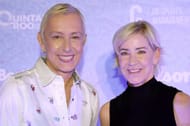Martina Navratilova has opened up about her relationship with her rival-turned-friend Chris Evert and addressed her portrayal as the antagonist during their competitive era.
Evert and Navratilova forged one of the greatest sporting rivalries in history. During their illustrious careers, they locked horns 80 times, including 60 finals. Navratilova led 43-37 in their overall head-to-head and enjoyed a 36–24 record in finals. The duo also dominated the landscape of women's tennis, each securing 18 Grand Slam single titles and a combined 34 doubles Majors.
In a recent appearance on the 'On With Kara Swisher' podcast, Martina Navratilova discussed the evolution of her friendship with Chris Evert. She emphasized the stark difference in their playing styles and personalities, which initially led fans to choose sides.
"That relationship, friendship, rivalry just evolved because it was over such a long period of time. The contrast in styles, the contrast in everything, our background, our upbringing, and then defecting and then coming here and the styles in play," Martina Navratilova said (at 13:00).
"Chris always played everything close to her vest. You know, she was called an ice maiden because you couldn't tell what she was feeling. So the contrast in everything definitely made people pick one side. You know, you couldn't really be neutral," she added.
Over time, as their careers and friendship developed, Navratilova observed a shift as fans began appreciating them solely as athletes and competitors.
"But I think as they saw, as our career developed and even the friendship developed, maybe people were more like just appreciating us as athletes and as competitors rather than taking a side.
"You know, it was pretty special because it just came out of nowhere, sort of. And it just kept going and kept going," she added.
The 18-time Grand Slam champion also explained why she was perceived as the "evil one" in their rivalry. She pointed to factors like her sexual orientation, the prevalence of Slavic phobia and her physique not conforming to societal expectations of women.
"So all of that, the social construct of what women are supposed to look like, as you said, then being gay, which was definitely against the norm back then. I came out in 81.
"So most of the rivalry, I was out, and that didn't help overall. I think part of it was phobia, Slavic phobia, I think that's still alive. And yes, it was good versus evil. I was portrayed as the evil one. So that, that kind of stuff is, that was hard," Martina Navratilova said.
Martina Navratilova: "I was the softy and Chris Evert was the hard one"

Martina Navratilova went on to say that another reason why fans had a misconception about her personality was due to the limited opportunites players had to engage with them directly.
"Because back then we didn't have a chance to speak to the fans directly the way athletes can now through their media. And now on tennis, you have interviews after the match.
"We only got to speak when you got to the finals as a winner or the runner-up. You know, you thank the sponsors, thank the ball kids and that was that. So you didn't really have a chance to speak directly to the fans," Martina Navratilova said.
The 18-time Grand Slam champion added that due to this, fans formed judgements based on appearances, mistakenly perceiving her as the tough one, when in reality, she was the "softy" compared to Chris Evert.
"So, you know, people had an idea of what I looked like. And based on that, they just assumed that's what I was like, when in fact, you know, I was the softy and Chris was the hard one. Yeah. But we both are now pretty much on the same page," she added.